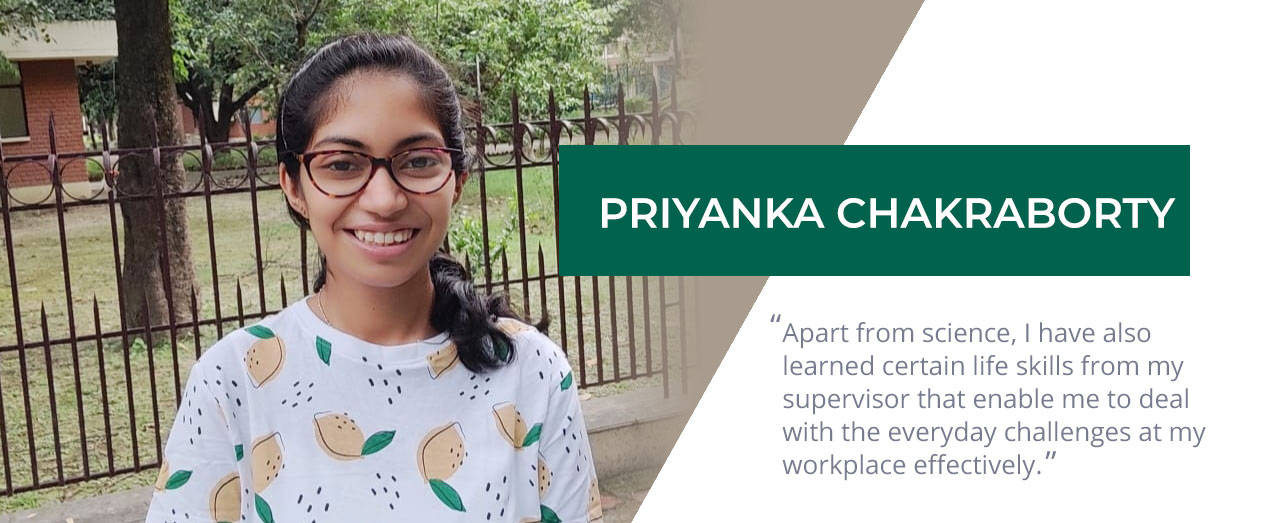
Priyanka, a graduate in organic chemistry, is pursuing her PhD at the Indian Institute of Technology Kanpur, under the supervision of Prof. Basker Sundaraju . Her research work focuses on base metal-catalyzed sustainable transformations and their mechanistic investigations.
Discovering the researcher withinSome minds are just passionately curious and for such people, getting into a PhD program happens organically. What is your story? What made you believe that PhD is your thing?
I never had an idealized image of the PhD course. I have had the experience working with other PhD scholars during summer internships or master thesis projects. I exactly knew what I was signing up for. Whether I’d fail or succeed in it didn’t matter then. Even now, 3 years into the research, I still feel the same. Of course, there are bad days when I barely have the motivation to make it through the day. But, there is a joy in exploring something new, and stumbling upon interesting results in the process is what makes the whole journey worth it.
Big picture of your researchWhat challenges are you setting out to address with your research work? Why does this study matter?
Transition-metal catalyst mediated dehydrogenative reactions have evolved as an atom-economical and selective methodology for upgrading small molecules into higher-order products. In general, the initial dehydrogenation reaction reveals a more reactive organic synthon that can undergo tandem functionalization reactivity to construct new C-C and C-N bonds. Alcohol is one of the key feedstock for the manufacture of basic chemicals in industries and its reactivity expands enormously on activation. Traditional methods of alcohol oxidation often require organic or organometallic coupling partners to drive the reaction forward which decreases the atom economy by contributing to unwanted waste products. Although significant advances using noble transition metals have been made in the past few decades, unfortunately, inadequate resources of 4d and 5d metals in the earth’s crust make them alarmingly scarce and expensive and renders the overall reaction cost-insensitive with a high ecological footprint. Hence, alternatives with earth-abundant metals must be sought. In this regard, we have described the use of a high valent Cp*Co(III) system in the alkylation of several carbonucleophiles with secondary alcohols. DFT calculations and experimental investigations to explore the mechanistic pathway of this redox-active and high valent Cp*Co(III) catalytic system shed light on the involvement of a new paradigm in the oxidative activation of alcohols, unlike its high-valent noble metal analogues.

All-important student-advisor relationship
Like in any other profession, when people have to work together, disagreements are likely to happen occasionally. The fact is that disagreement is not always bad, rather it is an indicator of one’s sheer commitment towards the organizational goals. How is your experience working with your PhD advisor?
Honestly, I have been quite lucky in that respect. My supervisor really brings out the best in me. He is strict at times and pushes me to expand my limits when necessary. He is approachable, values my opinions and treats his students as a priority. Apart from science, I have also learned certain life skills from my supervisor that enable me to deal with the everyday challenges at my workplace effectively.
In early 2020, I was in France for a short research stay at LCC Toulouse and before I could return back to India on the scheduled date, COVID 19 hit the world. It was a very depressing period as I had no clue when I could get back to India. He was a huge support during that period.
Embarking PhD is a big undertaking. The journey sees it all: Highways, side roads, and dead ends. What are those lessons you learned along this journey so far?
PhD is not like any regular degree which involves like studying the subject. It takes a lot more. According to me, self-motivation, consistency, patience and an open mind willingness to learn new things are most required in this journey. Like any other process, ups and downs are a part of the deal. Many a time things don’t go as planned. We all have bad days, failures, disappointments. But whether or not we choose to overcome it is what defines us. All we can do is learn from the process, keep working hard and make the most of any opportunity that comes our way.
Piyushi Nautiyal,
Science communication and Outreach Manager, India UK ISCC